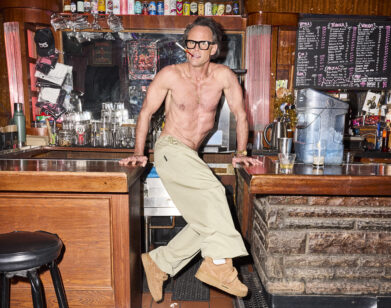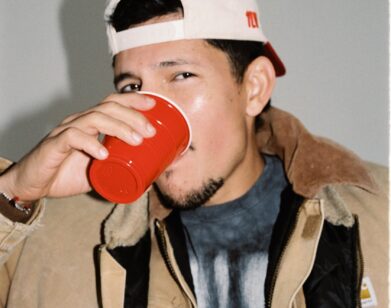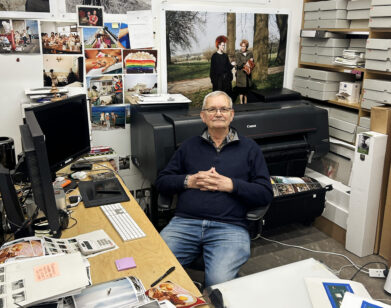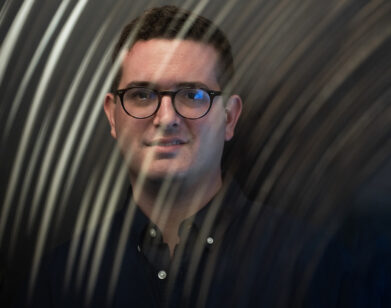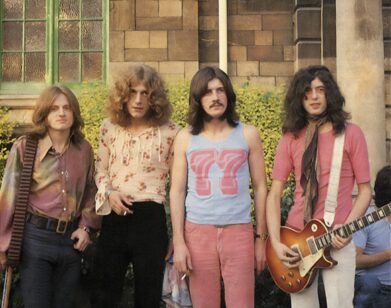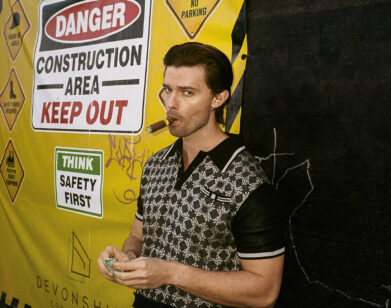Rick Famuyiwa’s Web of Truths
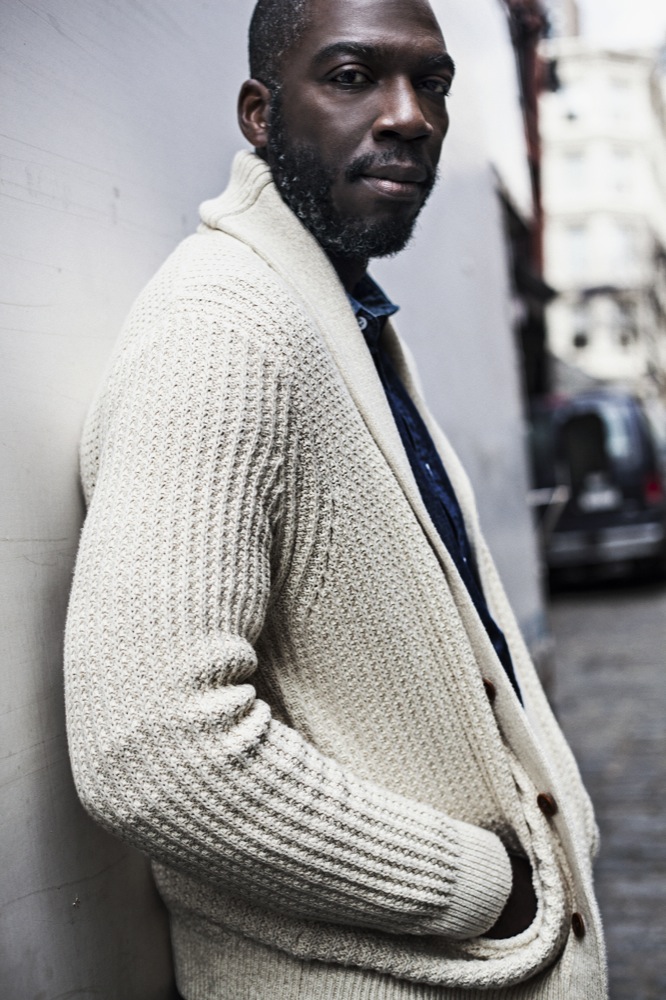
ABOVE: RICK FAMUYIWA IN NEW YORK, APRIL 2016. PHOTO: VICTORIA STEVENS.
In 1991, President Bush nominated Clarence Thomas to Supreme Court. Just before his confirmation, however, a professor from University of Oklahoma College of Law named Anita Hill accused Thomas of sexual harassment. Hill didn’t exactly come forward, rather she was approached by the Senate as a former subordinate of Thomas’ at the Department of Education and the Equal Employment Opportunity. She was assured her testimony would be kept confidential; it wasn’t.
Directed by Rick Famuyiwa and incorporating real news footage, Confirmation focuses on the he-said, she-said media circus during the confirmation hearings of Thomas. It’s easy to sympathize with Hill; played by Kerry Washington, she is portrayed as intelligent, earnest, and motivated by a sense of civic duty. She is initially reluctant to participate in the hearings, and clearly pained by some of Thomas’s comments she is asked to repeat for the world to hear. But, thanks to Wendell Pierce’s understated performance as the future justice, Thomas doesn’t come off too poorly either.
Born to Nigerian parents in greater Los Angeles, Famuyiwa studied film at USC and released his first feature, The Wood, in 1999. Now 42, Famuyiwa signed onto Confirmation while he was still in post-production for his teen comedy Dope. “It was a crazy experience, but one that I was happy to have,” he explains while in New York. “To be a filmmaker, you want to make films so you want to have that embarrassment of riches that you’re doing so many great things that it pulls you in different directions.”
EMMA BROWN: You’ve said before that you felt you’d lost your voice as a filmmaker, and Dope was sort of a return to form. Were you nervous about taking on a script that you hadn’t written directly after Dope?
RICK FAMUYIWA: A little bit. I hadn’t done it before, but there was such clarity of voice in this that it vibed with my own voice. The subject matter was also something that I was interested in, so I thought, “Okay, let me take this leap.” On one level that was hard because I’m so used to being the writer and being in control of everything, but it was freeing too. I was able to look at this script without the history that you have as a writer—you hold on and get married to things—so it gave me clarity to be able to look at the story and say, “How do we best tell this story?” It was a good process, not one that I feel like I always want to do but I think in this instance was right.
BROWN: I know that you had followed the story when you were in university because you studied Political Science. Have you thought about it since?
FAMUYIWA: I have always been fascinated by this story and the two people involved, so I thought about it and the impact that it had, specifically Clarence Thomas, because he was confirmed and he would routinely come up in terms of his own memoirs and the cases that he ruled on. I wouldn’t say that I thought about this daily or that it was something I was focused on, but the story was always intriguing to me on so many levels. It dealt with race and gender and power in our institutions, and there were so many truths that were coming from places I didn’t want to hear them from.
BROWN: What do you mean by “truths coming from places you didn’t want to hear them from?”
FAMUYIWA: I was in school. I was 18 years old when this was happening. At that time, I was looking at it so much from the perspective of a young black man who grew up in L.A. with very tough and interesting and backwards racial dynamics. The spectacle of this struck me in a very personal way, seeing these two black professionals being pitted against each other on this stage and the panel of all-white male judges and senators—not really judges, but in judgment of these two people. Clarence Thomas was being ripped apart on the public stage, and the same with professor Professor Hill, so when he dropped the whole “high-tech lynching,” it was something that, at that point, I could look at and say, “Yeah, I understand where you’re coming from. Even though I don’t agree with your politics or judicial philosophy, I understand what that means. As someone who is now at a private university, I understand what it means to have your qualifications questioned and whether you deserve something questioned.” It was complicated thing. In terms of where I stood and my own belief system and how I felt politics should work, he was different in many ways, but I could also identify with him and what he was going through. That’s what I mean in terms of there were so many truths in this story coming from places we didn’t necessarily want to hear. It would have been more comfortable for us as a society if Anita Hill wasn’t as intelligent, poised, and credible as she was. It could’ve been easily dismissed, but she didn’t quite fit what everyone thought of when these charges came out. There were truths coming from so many different unlikely sources that it challenged me, it challenged us as a nation. But I look back on some of the feelings I had then, and I go, “Those are the feelings of an 18-year-old and not a 42-year-old who understands that life and people are complex.” We’re always in this search for good and evil and who’s right and who’s wrong in stark terms. This was one of those moments early on in forming who I would become that challenged me in a lot of ways.
BROWN: I understand that you want to tell the story as objectively as possible, and it’s not necessarily a question of who is right, but how the whole thing was handled. Was that difficult though? How did you approach that?
FAMUYIWA: How it was handled by the judiciary committee, the people involved, the people that were on opposite sides of the issues, we can look back on and have commentary and criticisms. In terms of who told the truth and who didn’t, those are things that are unknowable. We all have our strong opinions about who we believe, but I didn’t think that that should be the leading edge in telling this story. Obviously your own personal beliefs come out in your work; I’m sure you can look at the film and probably glean where I’m coming from.
BROWN: Were there moments when you were editing it where you were like, “This scene feels like it skews more one way, and while that’s what I personally believe, I don’t want people to watch it and think that I’m being biased.”
FAMUYIWA: I don’t necessarily think of the audience in those terms. I just want to get to what I believe the story needs to be and what the truth of that is. It sounds harsher than it is, but in those moments, you don’t care about the audience, you just care about the characters and the story.
BROWN: How did you talk to the actors about it? For the People v. OJ Simpson, which is obviously quite different, Cuba Gooding Jr. talked about playing OJ as if he thinks of himself as guilty in one scene and thinks of himself as innocent in another. Did you discuss that with the actors?
FAMUYIWA: As filmmakers and as actors, you have to find truth. It was interesting, the way that the schedule broke down because of Kerry’s schedule and her commitments to Scandal, we had to shoot her first. She came in and shot most of her stuff, Wendell came in and shot most of his stuff, and then Greg Kinnear and the senators had their stuff. There was intersection in the hearing, but for the most part it was like we shot three separate films. In that way, it was easy when we were making the “Anita Hill film” to say, “This is about your truth,” because that was her point of view. When I was in the moment with Wendell Pierce and dealing mainly in the world of Clarence Thomas, it was about his truth and what he felt was true. It was interesting to talk to both of them about it. In the case of Clarence Thomas, we talked about a moment in the hearing where he actually says, “If there was something that I may have said that was offensive in anyway I apologize for that,” because it was clear that he himself was grappling with what that may have been, even if he didn’t feel like there was anything that rose to that level. That’s in the public records; it came right before his categorical denial. There were so many interesting aspects about what sexual harassment was—what men and people in that time thought it was. Today we have conversations about this, but these conversations weren’t happening 25 years ago. I think because of our segmented schedule and because it was about getting to each character’s truth, it was easy to tell each actor, “You’re the one telling the truth. This is your story.” That’s how people still react to it; supporters still firmly believe him and her supporters firmly believe her.
BROWN: It’s interesting that there hasn’t been a shift in opinion as society’s view of what constitutes sexual harassment has shifted.
FAMUYIWA: It’s interesting to wonder how a confirmation with these allegations would happen today, whether there would be a nominee put forward that had even a hint of this. There’s so much about how we deal with each other, both in terms of race and gender in our politics that still need a lot of examination, but I do think that this was pivotal moment in starting the conversations. There are a lot of things that we take for granted as truth now that even 25 years ago weren’t part of the public discourse.
There was an interesting moment as we started the production of this film where, because of HBO as a corporate entity, we had to have a talk about sexual harassment and what it means. Here we are about to tell this story about Anita Hill’s claims, and we all have to go through our moment of training and talking about what this means in a very corporate sense. Part of why we’re doing this is the subject of the film we’re making, and yet here we are full circle in this human resources conversation sexual harassment.
BROWN: In terms of the cast, was anyone in talks or attached when you signed on?
FAMUYIWA: Kerry was the only one attached. She was very instrumental in getting the story told. She’s an executive producer and was always attached as Anita Hill, and I knew that going in. Even if she wasn’t she would have been at the top of my list. Everything else was the same process that you go through when making a film. I had some ideas about who these people would be, specifically Clarence Thomas. I’ve been a fan of Wendell Pierce for a very long time. He was in one of my early movies and he brings such a level of heart and humanity to his roles. I knew there were these characters that have been created of Clarence Thomas, Anita Hill, even Joe Biden—”Uncle Joe”—so I wanted to make sure that we were getting beyond the one-dimensional caricatures we associate with these names. I knew Wendell would do that. Clarence Thomas is a hard and complicated character to play. He’s still an enigma; he doesn’t speak much on the bench, he doesn’t speak to the press.
BROWN: It’s interesting to think about the roles of Joe Biden and Ted Kennedy in this story, because today, at least I tend to think of Joe Biden as “good” person and Ted Kennedy as more problematic.
FAMUYIWA: Well that’s the thing. I wanted it to be just Joe Biden, person. Ted Kennedy, person. Good or bad is what we tend to want to affix to people, but we’re all complicated. I think that’s why it’s not necessarily all about the he-said, she-said. I don’t know if any of us could stand up to the scrutiny of how we saw the world and maybe even how we behaved in the world in our twenties.
BROWN: But you have to hold people accountable. Even if it’s not as simple as “good person,” “bad person,” there are actions that you wouldn’t want people to do.
FAMUYIWA: Yeah and I think that’s why Anita Hill felt compelled to move forward. She respected the institution of the Supreme Court, and when she was approached by the senate judiciary committee, she felt that this was something she had to say because of the weight of it and trying to bring people to account. Earlier I said that there was a system and you can find so much fault in how the system dealt with this. Anita Hill was betrayed by the process. She thought it would be confidential and it wasn’t. Maybe you can say she was naive to think that, but that’s what the system was supposed to ensure for her so that they could address it in a way that wouldn’t become the spectacle that it did. But part of me is glad it happened on the public stage, because if it was something that was quietly dealt with between the senators, it wouldn’t have exposed the issues that we have today.
BROWN: I like how you incorporated actual news footage into the film. Was that something that you wanted to do from the beginning?
FAMUYIWA: It was because we all remember it as a television experience. The coverage was seemingly non-stop—although it pales in comparison to what we have today. It was something that focused a nation in one direction, which doesn’t happen much today. We’re all distracted by the multiple sources of information nowadays. How we digested the story was so much in the hands of the journalists who were covering it—to bring that point of view was something that I wanted to do early on. We had a great research department at the network too who were able to pull hours and hours of news footage.
BROWN: That must of taken ages.
FAMUYIWA: Yeah, and going through it was a challenge, but it was educational and it was enlightening both in terms of how our journalism has changed and even just watching the commercials and some of the imagery in terms of how women were seen. When you would juxtapose that with the hearings, you’d sort of understand why some of this stuff didn’t feel as urgent at the time as it does now. I wanted to use that bit of visual history to help tell the story and put the audience member in that moment, versus being the omniscient presence from the future looking back on it. I felt that would ground the audience in the present tense.
CONFIRMATION PREMIERES SATURDAY, APRIL 16, ON HBO.

